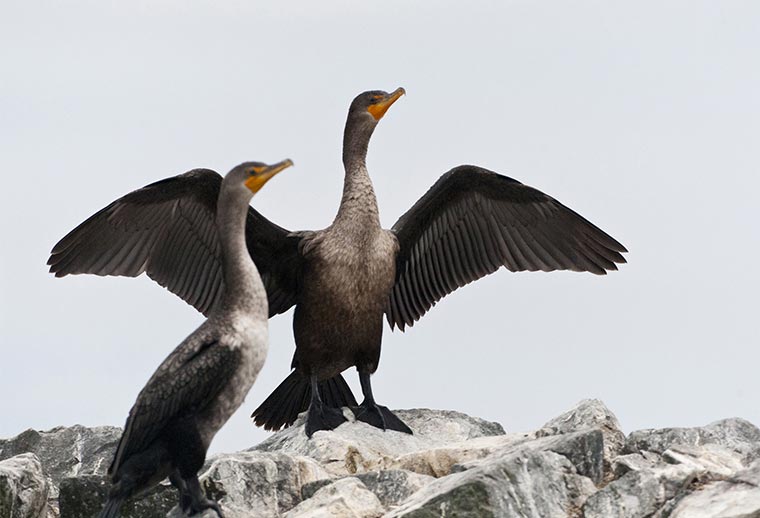 An Environmental Bill of Rights (EBR) Registry Proposal Notice released on Nov. 19 is asking for input regarding a proposed hunting season for double-crested cormorants starting in 2019.
An Environmental Bill of Rights (EBR) Registry Proposal Notice released on Nov. 19 is asking for input regarding a proposed hunting season for double-crested cormorants starting in 2019.
The proposal, if approved, would list the cormorant as a game bird, like ruffed grouse, and allow anyone with an Outdoors Card and small game licence to hunt them during a Mar. 15 to Dec. 31 season. During that season, hunters would be permitted a bag limit of 50 with no possession limit.
This would be accompanied by an exemption that would make small game licences in northern and central Ontario valid from Jun. 16 to Aug. 31 for cormorant hunting. Shotgun and shot size and type would be consistent with those of the Migratory Bird Act and hunting would be allowed from a stationary motor boat.
The Ministry of Natural Resources and Forestry (MNRF) is also consulting on a proposal to amend the Fish and Wildlife Conservation Act, which prohibits anyone who kills game wildlife (including game birds), or who possesses game wildlife killed by hunting, from allowing that meat to spoil. The amendment would add provisions permitting hunters to allow cormorants to spoil, though they would be required to retrieve and dispose of the carcass.
The EBR posting notes double-crested cormorants are abundant in Ontario and says the proposed hunt is not expected to affect their sustainability.
The proposal’s 45 day public review and comment period began Nov. 19, 2018 and ends Jan. 3, 2019.
All comments received prior to Jan. 3, 2019 will be considered as part of the decision-making process by the MNRF. Comments can be submitted in writing or electronically using the form provided in EBR Registry number 013-4124, which can be found here.
Ontario Federation of Anglers and Hunters Resources Management Specialist Lauren Tonelli says, “The OFAH has been asking the government for cormorant control for decades, so we are pleased to see action being taken. This proposal would allow hunters to target cormorants, but won’t be effective in areas where hunting is not permitted such as city waterfronts and many protected areas. Without a larger provincial management plan that includes removal of cormorants where they are overabundant, we will continue to see ecological damages.”


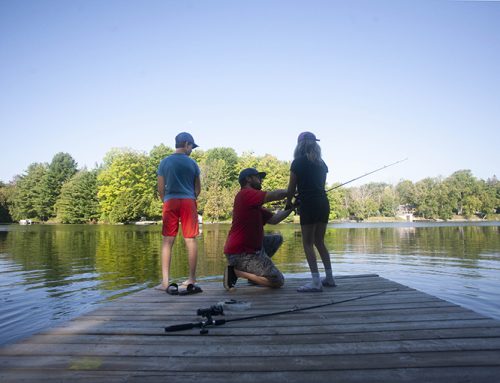
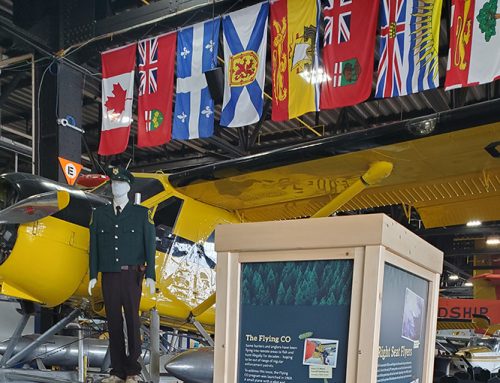
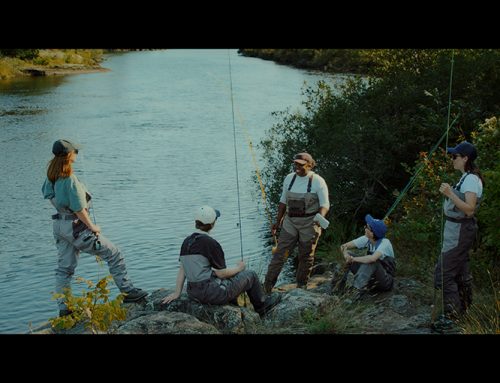
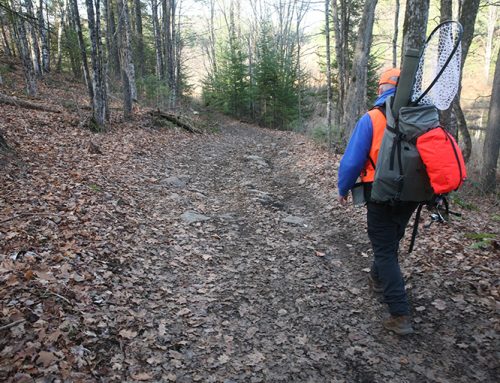
This should have been done 10 years ago. But better late then never.. Good job.
I do believe there should be a cull on these birds …their numbers are way to high..They have killed one island(bull) and now they moved to another..they are killing tons of perch,bass,and whatever swims near them …so i vote lets kill them to get there numbers down
I think hunting the cormorants is a great idea. These birds are seen here on the greater lakes by the hundreds if not thousands in places. Their numbers in my opinion are way out of control. Lessening their numbers will greatly impact small fish populations in a great way. As a licensed hunter and fisherman I think it’s a wise conservational decision.
Yes! This hunt is needed! Have seen a great number on them on lake nipissing in sudbury / northbay area! Can see them killing so many fish out of a already fragile lake! We need the reduced or gone
definitely needs to be done they are out of control and are killing more then the fisheries , these birds are a nuisances and need to be taken care of I’m for the cost of the shells and wouldn’t mind this at all .
I think hunting would be a good tool for keeping cormorant numbers in check
Please Do Not allow this. I realize people believe them to be a nuisance. I also realize that they appear to be abundant in Ontario. But appearances can be deceiving. It is my understanding that there are roughly 2 million in all of North America. That is not very many at all for the entire continent. Majority of them reside in Ontario. With the proposed hunt it would not take long to vertually make them extinct.
I believe a season is needed to cull these birds that are destorying some of our fisheries i hope you do the right thing and open the season
Please go forward with this, they are destroying everything they touch.
This proposal is a start at addressing the effects of this non native invasive species. I would go further however and place feral pigs at cormorant nesting sites. These too could be harvested and would result in a much more immediate solution to this problem.
As a property owner on the Bay of Quinte These birds are destroying trees with there toxic dropping’s and should be controlled. We need to protect our waterways.
Stupid…. Number 1 rule of hunting don’t shoot it if you ain’t gonna eat it killing for no reason is stupid
I think it’s a great idea. They are to populated in many areas and think the hunt should be approved
I believe a season for the cormorants is long overdue. The negative impact they have on our evironment and the fisheries is far too great.
It’s about time. There are way to many cormorants.
I believe there should be a season, if not open season, for the hunting of these preditorial birds. They destroy fish populations and other natural habitats in an area where they decide to make a roost. I live in Apsley, Ontario and have for 19 years this summer, while I was fishing, was the first time I have ever seen a cornorant in the area and it made me wonder why they are moving further North.
Thank you thank you thank you it’s about time
I think it would be a great thing to shoot these worthless birds
It’s about time someone is thinking about these killing machines. They have ruined landscapes nesting and are depleting our fish stocks. We invest to maintain and improve our lakes and they eat it faster than we can put it in. I do believe responsible hunters will come to the call and assist in the control of their population.
John.
I think it’s a great idea.
I agree with this purposel, I am also a fisherman. I have seen flicks of these birds come to a fishing hole and kill it. While doing these the sit in tress and there is so many the poop kill the trees.
Hope with starting a season on the birds that they are more controllable and could help, the fishery and properly owners around lakes that have large numbers of them
I firmly agree with this proposal. I have seen the cormorant population multiply on my lake in the Ottawa Valley. It is disrupting the fish population and this effect will only grow exponentially unless we intervene. Their droppings are leaving trees bare and unable to recover.
We know the significant costs these non native birds are putting on our lakes, what are the significant benefits, if any?
Yes let the hunt begin!
The bloodthirst knows no bounds.
Follow through with this, they are hurting habitat, and fish population
A cull of these birds is absolutely necessary! Please open the season- these birds are destroying our lakes and rivers!
it’s about time. there are way too many.
I support the proposed cormorant hunt.
Sounds good about time something is done .
Definitely long overdue! These birds eat and destroy everything around them! Numbers are out of control. I can’t wait to be able to legally take matters into my own hands
It’s Definitely long overdue! These birds eat and destroy everything around them! Numbers are out of control. I can’t wait to be able to legally take matters into my own hands
I agree with controlling the population, I see the first hand damage on the eco system of these birds. I live on a natural fish spawning river where these birds conrigate near. we worry yearly every time one is spotted in the river if they all will be coming in short time to devastate.
Questions I would have would be, how to dispose of the carcass’ safely, and weather controlled kills can be arranged by municiple council and carcass management dealt with this way.
Thanks. Look forward to learn more
Joel Giles
Need to be done they are destroying the fishery up here in Northern ON please go ahead with it!!!!
I support the hunt 110% Should have started 10 yrs. ago
As a nature lover; I believe we need to control their numbers through hunting. The lake where I usually go fishing has lost all the trees on the islands because of their guano. The fish stocks are noticeably declining because of their huge appetite even for spawning fish as large as 18 inches in length. (walleye and musky)
I am a Angler and Hunter ,I fish the St Lawrence river in the last year the population of the Cormorants have taken over .They have destroy all kinds of trees on the island’s and talking a great population of the fish in the area.l agree that there has to be something done about it before it’s to late to control them.
I agree 100% with bringing in the cormorant hunting in Ontario. I fish the BOQ and they kill a lot of the habitat on the islands with their feces. They do however eat the round goby that is an invasive species. I’ve read through some of the comments here and some people think these birds are a non native invasive species. They are in fact native birds.
These birds have overpopulated some areas . They are great swimmer/hunters and pose a risk to our Fisheries. It seems that their feces production is also excessive and they are ruining Islands, bouys, navigation towers, docks, and marinas. I believe a cull is necessary
I AM TOTALLY IN FAVOR OF A REGULATED HUNTING SEASON FOR CORMORANTS. AS AN AVID FISHERMAN, I FIND IT HARDER AND HARDER TO CATCH FISH IN ONTARIO LAKES DUE TO THE FACT THAT CORMORANTS ARE FEEDING IN ABUNDANCE ON THE LAKES ALMOST EVERYWHERE YOU GO. THEY ARE RAPING THE LAKES OF SMALL FRY AND THEREFORE DIMINISHING THE CHANCE FOR THESE FISH TO MATURE AND REPRODUCE MAKING THE FISH POPULATION LESS AND LESS EVERY YEAR. I PRACTICE CATCH AND RELEASE AND ONLY KEEP WHAT I WANT FOR A MEAL. I MAY AS WELL KEEP EVERYTHING I CATCH BECAUSE I RELEASE THEM RIGHT INTO THE MOUTH OF CORMORANTS. THANK YOU FOR CONSIDERING THIS REGULATION.
This is a thing that should have been done a few years ago. The numbers need to be knocked down a lot.
These birds are a menace…destroying shorelines and decimating fish populations. About time something is done. We should have begun this when they first starting coming in
They are invasive. Look at wolf island or Burlington bay. I am willing to save the environment with my shotgun and donate to real conservative with my tag $
WE should allow the hunt for population control, we already allow hunting for crows and starlings and other blackbirds for the purpose of pest control bexaus they are damaging to crops ect. And their populations remain abundant and not out of control, why not do the same with Cormorants? I cant see this depleting them so much that we would have to worry about their population going below a safe number. And harvest numbers and seasons can be adjusted accordingly from year to year. As hunters it is our responsibility to know the current regulations of our quarry and we must research every year.
I live in upstate N.Y. on
st.Lawrence River. I have been lobbying for a cormorant season for years. These birds are non-native, invasive species and have devastated fishery on property on both sides of The Border. I had suggested a fee for being allowed to hunt these birds with monies going to a govt. program to also help control problem. I salute the Canadian govt. and involved groups in getting this done. I hope state govts. in US folloow. I also hope that US Sportsmen are allowed to participate in Ontario hunt. Good Job Neighbors.
The plan as laid out is good. These are a very destructive bird,both to the land and fish stock. We are spending a lot of money on restocking only for them to become bird food. So yes clear them out.
This season on theses birds is required
Keep up the good work OFAH. These birds need to be controlled in Southwestern Ontario in Lake St. Clair and Lake Erie.
i sure hope the proposal goes through as they are very over abundent and a nuisance when your out fishing and there are hundreds of them. they eat alot of fish and destroy trees so that would be a welcome bill good luck
It’s about time something is done about their population as they are de7structive and and also they eat so much fish no wonder fishing sucks
Why so suddenly must a species come under legislation that would allow them to be eradicated by senseless slaughter except for the joy of trigger happy hunters. Have any non hunters ever proposed such a desire? I think not. We have been given a very specific task on earth, protect and preserve all creatures great and small along with all forms of plant life.
Don’t approve the killing of creatures that have directly or indirectly helped create an atmosphere on earth that preserves life even if they have taken a life so that they might live.
Something need to be done I say green light on a year round season
Dumb idea. Too little too late. All it will do is further lower the image of hunters as mean-spirited killers with no regard for life. The antis will eat this up and proudly show any and all piles of dead birds they can track down.
The answer isn’t just shooting but rather the destruction of eggs/nest shooting their tree nests. OMNR and DFO should be doing this quietly.
I recall when the issue of controlling deer in Federal parks came up and the gov’t decided to not let hunters do it but used their own personnel. Guess they like shooting deer but not cormorant nests.
Fed and prov officers should have a plan as to where and when and how to attack specific roosts during nesting season. It’s part of their job IMHO.
Rather they would lazily sit by as hunters do the work and take the heat.
They should also develop means to use the carcasses perhaps as fertilizer. What do rendering plants have to say? Can they use carcasses for something? Has gov’t even bothered to research any of this? Deer hides are collected…….. and I know MNR doesn’t like dealing with the stinky things.
Gov’t is playing hunters as fools on this one. On a problem gov’t has been denying and hiding and is therefore partly responsible for.
Wild life officers are out there anyway and should know where and how best to deal with the roosts.
Hunters/anglers/others could still serve as volunteers to help gov’t officers do the work. Good way of screening the ‘I wanna shoot sumfin!’ weirdos out of the volunteer helpers would be to make them aware that before they get to ‘shoot sumfin’ they must dispatch a certain number of the trapped birds humanely by hand.
Hopefully some gov’t types in positions of authority read this and can get some perspective on what to do. Heck right now many municipalities are quietly kerosening Canada Goose eggs.
I recall in the 1980’s there was serious concern that the cormies would disappear. Huge media uproar happened when some drowned in commercial fishing nets around Bay of Quinte. Well IMHO that pop’n crash may have been from the DDT/mirex/? that was found to be thinning eagle eggs. A resulting ban on the egg-thinning stuff may be why the cormies have exploded. Or perhaps this and the usual case of a pop’n crash due to disease that flows through it.
To try and genetically engineer a solution may be bad for other species if in a consumable format. (Eagles and such also eat same stuff). To capture and introduce a genetic modifier to birds would be a long-term solution since the treated birds would be unable to affect the breeding of other birds. I suppose a spray treatment of nests may be able to get into their system, but again, eagles, osprey, other species landing on the nests would also be affected.
The best way to ‘treat’ the nests is to have shotgun pellets go through.
AND since the nests are being shot then no need for steel shot. Volunteers/wild-life officers can dig out the old #4 shot and use full chokes to easily destroy/perforate ‘the nests’. Also from what I hear the cormies do not like being disturbed and so the adults leave before the roost is arrived at.
They can return to twig-infused omelettes.
The Feds just need to pass regs allowing such ‘treatment’ of nests.
Hey and this is just off the top of my head. Anyone in wild-life management paid by taxpayers should be able to fine-tune the idea. Maybe they already have a plan that they quietly want but are afraid to go forward with.
Biggest concern to me is that many wild-life management people are into the ‘let’s get nature back the way it was’ mindset. They want nature to take its course and not control native species like the cormies. This is who is standing in the way of anything being done. These are the folks who are denying the cormie impact of fisheries. They are happy to lie about things to attain their end objective. Their mantra is “The end justifies the means’. Politicians/Ministers need to know the truth about what is going on. They won’t get it from their underlings.
Yes really need to get this through
Excellent idea. These birds are distorting our lakes fast ! There are thousands around lake simcoe and lake couchiching.
Most northern lakes have very small if any population of cormorants. Hunters will be shooting loons by mistake and leaving any slaughtered birds to rot in the lake. Stupid idea based on no apparent empirical study. At least identify the lakes where culling is necessary. Open hunting of up to 50! birds is obscene and destructive to fragile northern lakes.
Yes I am in agreement to have them shot they kill the fish population they destroy islands with their feces and they destroy property
I totally agree and think something definitely needs to be done about them
Sonya, that is patently false. The majority of Double Crested Cormorants are NOT in Ontario.
Please fact check. Ontario historically was not even part of their range. They are expanding (invading) into Ontario, with few to no natural predators.
https://www.allaboutbirds.org/guide/Double-crested_Cormorant/maps-range
[img]https://d1ia71hq4oe7pn.cloudfront.net/photo/31913881-1280px.jpg[/img]
I do hope something is done very soon. I am sure they consume a lot of fish and destroy the trees they perch on
I think a hunting season is a bad ideal. That would identify them as a migratory bird, like geese, instead of the invasive species that they are. It should be an open season, like on crows. no limits. Also it should be encouraged to destroy nests and oil eggs. An education program should be installed.
I agree with a cormorant cull, in certain areas. While I see the frustrations of property owners stating that birds are destructive to trees and plant life on islands it’s part of a natural cycle. Most old growth on these islands isn’t affected by much other than age, disease or flying insects that make it to the islands. While it may be an eyesore to some the regeneration of new forest and the decay of the old growth will actually be beneficial in the long run for most of these island that lose nutrients and soil from the wind carrying it off the island. I also see a lot of “anger” towards these birds as people say they mostly consume sportfish species however I would actually challenge you to look into the diet of these birds and perhaps once you’ve shot one if this goes through to do a necropsy of the bird and examine the stomach contents for yourself, I can bet you will find a lot of species of fish that wouldn’t be identifiable as a sportfish such as the slow moving round goby..
The other factor that i perceive that will be challenging is people hunting these birds by LAWFUL means. Which does not include running around in your little aluminum boat trying to shoot every bird that you chase down. This doesn’t mean people will be able to use single projectiles to hunt birds as the same regulations as hunting waterfowl will still apply. As an avid waterfowl hunter I do understand these birds will sometimes decoy with duck decoy but I don’t see any companies selling Cormorant decoys, so what’s everybody’s plan to hunt them? I’m truly curious to see how these hunts will work out and I do see more problems than none occuring due to ignorance. Most of the people who are for this hunt are typically against people even hunting ducks on a lake but they’re all for people killing a ‘Nuisance’ bird. I support a cull but I do not support an eradication. Everything has a purpose in our ecosystems. I don’t hear people complaining about other fish eating animals and birds; otters, mallards(yes they consume fish), mergansers, ring neck ducks, herons of all varieties, pelicans (Yes there are populations of pelicans in Ontario)…
I am in fear of what this will bring for new by laws regarding waterfowl hunting in certain townships/municipalities. I already can’t wait for the pictures and complaints from the same people who wanted them gone of the birds washing ashore on their beaches and properties from people who have discarded their kill. Or the people accidentally shooting goose and ducks out of season. Hunters just remember to be aware that with a public notion asking for our assistance to reduce populations, this can also backfire on us when the populations sink to all time lows.
Also as a final point because coincidentally there seems to be A LOT of uneducated people in this comment stream the Double-crested Cormorant is a NATIVE species to Ontario. Incase you would like to know also what one looks like https://www.allaboutbirds.org/guide/Double-crested_Cormorant/id# follow the link..
It is about time control is being put on cormorants. In Kingston all you have to do is look at Snake Island and the Brother Islands to see the damage these birds do to the trees and vegetation.(there is none on these islands because of the cormorants) I have also seen the cormorants moving north, probably to get more food as they have consumed most of the fish around Kingston.
Hunting cormorants is needed. They are large in numbers cause damage to plant life due to excrement. And have a voracious appetite for fish. I am in favour of hunting Cormorants.
Sincerely, Robert Stavenow.
It,s about time. These birds are continually moving northward and invading our walleye lakes.we need to control their numbers now.
I agree 100 % of reducing the Cormorant population all over Ontario by puting them on the small game list , I live on the lake near Hamilton , Burlington shore and every morning the Cormorant flights last for 15 minutes to pass by , thousands of birds after all the bait fish . the season should be open 12 months of the year . Now how to reduce the population that come out of Hamilton bay would be hard to do , shooting would not be allowed there. I don,t know of any positive things about these birds , its good to see this problem is being addressed now
reading some other articales about over population of white pelicans in the Lake of the woods is another problem that also should be addressed
Totally agree – there are way too many of these things, and they must be controlled. They will also have a negative impact on fish populations.
As an avid fisherman, living on the shore of Lake Erie, I know firsthand the damage these non-native species can do to a fishery and to the environment in general. The smaller islands in the middle of the Western Basin are practically void of everything; trees, vegetation and subsequently, most other animal life.
I would take up hunting, just to reduce the numbers of these birds.
Please move forward with this!
Please remove the excessive number of Cormorants. When I see a flock of over 500 looking for food, at least once a week on lake Simcoe I shudder . The small fish / minnow population that used to be abundant along the shore line has all but disappeared. Several small islands on lake couchiching have the look of a burned out forest fire due to the large number of nesting birds The situation is out of control something has to be done before it is to late.
Think this out as an angler an hunter you are handing a gift to the anti hunting animal right activists…. just think of the press coverage when a “hunter” leaves 50 birds to rot in the summer heat and abandoned nests with young it will set public opinion about hunting back to the stone age
It’s about time! There are far too many of these live fish eating black vulchers and their excrement has killed far too much vegetation and trees!!! Many islands are just a pile of rocks because of this no good bird! Watch out for the Greenpeacers, they will be all over this action, but I am all for it!!! GOOD LUCK….Cheers..Howie
See them sitting in trees all along the parkway in Fort Erie. Where they roost the trees are dying. PortColborne by the light house use to be full of Seagulls. Now its black with thousands of the Cormorants. Hopefully if you get rid of them our Perch will start comming back for shore fisherman. The Perch fishing has ben sad for about15 years unless you go out a mile or two. Im all for this hunt and so is my family.
So sad to read some folks are keen to kill cormorants, scapegoated for decline of fish stalks. We would do better to protect our waters defiled by human sewage, chemicals, plastic and the degradation of wetlands and shorelines through cutting down trees and development. Bird guano? Have you not seen, smelled, the amount of human garbage in the water, on the shorelines!! We humans are solely to blame for less fish/ aquatic life by our continued disregard of the natural world that freely sustains us.
North America has a billion fewer birds already, 40% less than we did 40 years ago! Sparrows, once so common, are now on the endangered list. They are the canaries in the coal mine, providing advance warning of danger to humans.
This proposal is spot on. Actually a long time coming. These birds have proliferated to the point that they are not only eating all small game fish, but killing all the trees they sit in. Case in point: downbound dykes in the Detroit river. All the islands out in Lake Erie. Now on the shoreline here at Amherst point etc. These birds gather by the thousands in front on my house on the water, and dive in groups, eating every little fish in there way. This has been going on for far to long because of the governments inaction to cull these things. The tree huggers dont help,at all in lobbying the gov. To not hurt these creatures. They,are now talking over nesting areas in the marshes here and they must be eradicated, if it’s not too late already. A limit of 100 would be better suited the first year. After that they could drop it to 10 or 20. It will take years to get this population down to where it should be. In my opinion they are no good for nothing birds. I am not a hunter but every day I see them when I go outside.
We need to cull these birds, and should have done it 20 years ago. They have even killed some of my trees with thier guano crap.
What happened to the cormorant Hunt??
Thank you Ken. We haven’t done an update on the story but pls stay tuned. -Jason